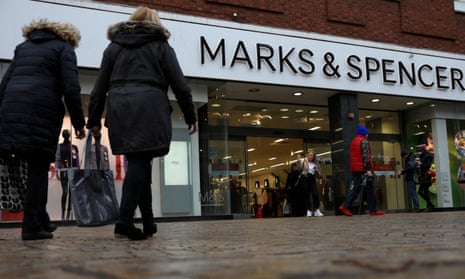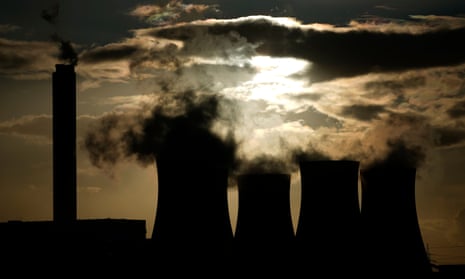Key events
M&S chair calls post-Brexit plans 'baffling' and 'overbearing'
The chairman of Marks & Spencer has become the latest business leader to criticise the government’s economic policy, as he described its plans for post-Brexit trade as “baffling” and “overbearing”.
Archie Norman, a former Tory MP, said the plans for solving the Northern Irish Protocol stand-off would push prices higher and give EU companies a competitive advantage over their UK counterparts. His comments on planned labelling changes for retailers came in a letter to the foreign secretary, excerpts of which have been seen by the Daily Telegraph.
Last week, the billionaire businessman Sir James Dyson accused the government of a “short-sighted” and “stupid” economic approach while the director general of the confederation of British Industry questioned the lack of a “strategy”.
Norman said:
The overbearing costs of a labelling regime would raise prices and reduce choice for consumers, further disadvantage UK farmers and suppliers and impact UK retailers competitiveness in other international markets.
The simple fact is retailers already operate in real-time digital information – day or night, at the click of a button, we can locate our products be that in a depot, in transit or in a store.
In a digital era, when one tap of a mobile can check-in a customer at store and locate their order in under 60 seconds, it’s baffling that the government and EU have rewound four decades to discuss an expensive ‘solution’ involving stickers and labelling.
Using different product labelling could in theory ease the need for customs checks at the border but the M&S chairman argues in his letter that it would lead to increased costs for producers and in turn higher prices for customers.
A costly labelling solution will mean customers will be hit by reduced ranges, higher prices – at a time of huge inflation and when the economy in Northern Ireland is already disadvantaged – and a worsening of availability.
This proposal adds cost, labour and complexity at a time when the supply base really does not need it and is struggling to stay on its feet to the specific advantage of EU producers.

National Grid asks coal plants to warm up in case they are needed

Jasper Jolly
The National Grid has asked coal factories to warm up in case they are needed today, amid continued cold weather across the UK.
Two coal units at Drax in Yorkshire and one at West Burton in Nottinghamshire were asked to fire up just before midnight yesterday. The West Burton unit was stood down at 5:13am, but the Drax units have continued to heat up, according to notifications sent to the industry.
National Grid has been active in balancing the UK’s energy supplies in recent days as it copes with colder, less windy weather which pushes up energy use and causes power generation from wind to drop.
It was the third time in the last week that the National Grid’s Electricity Supply Operator (ESO) has asked coal plants to warm up in case they are needed.
National Grid has also been running its demand flexibility service for the first time this month outside of trials. The service pays households with smart meters for energy reductions, helping to reduce peak demand which means it has less need to draw on more polluting energy sources when energy use rises in the evenings. Some businesses were already paid to reduce energy use.

Donald Trump allowed back on Facebook and Instagram
The former US president Donald Trump will be allowed back on Facebook and Instagram, as the company behind the social media platforms, Meta, said it would end the two-year suspension of his accounts. His Twitter ban has already been lifted by the firm’s new owner Elon Musk.
The suspension will end “in the coming weeks”, Meta said.
Meta’s president of global affairs, Nick Clegg (a former UK deputy prime minister), said a review had found that Trump no longer poses a serious risk to public safety. Clegg said the public “should be able to hear what their politicians are saying”.
Trump’s accounts were suspended when he, then US president, encouraged his supporters in January 2021, via his social media accounts, to storm the US Capitol building and disrupt the presidential election certification process, after Joe Biden won the election.
In response to Meta’s decision, Trump posted on his own social media company, Truth Social, yesterday, saying that Facebook had “lost Billions” after banning “your favorite President, me”. He wrote: “Such a thing should never again happen to a sitting President, or anybody else who is not deserving of retribution!”
News of Meta’s decision has been met with fury and indignation among civil rights and online safety advocates.
Haldane explained why the UK economy has fared worse than others:
We’ve seen many businesses teetering who have been able to just make it through Covid and the cost of living but are vulnerable to any shock that might come along.
Think of it as a weakened societal immune system, that we’ve run down our defences and that makes us particularly vulnerable nasty coming along.
It seems that recent shocks that we’ve had, which have been global, from Covid to the cost of living, but the UK always seem to cop disproportionately for the after-effects in terms of hits to income and lives and that is down to us not having invested sufficiently in our systems whether that’s health or education or charities.
Introduction: Former Bank of England chief economist warns of 'more pain to come' in rising mortgage costs and falling real wages
Good morning, and welcome to our rolling coverage of business, the financial markets and the world economy.
Andy Haldane, the Bank of England’s former chief economist, now chief executive of the Royal Society of Arts and a government adviser on levelling up, has predicted real wages would fall again this year as higher mortgage costs continue to bite. He also warned that the recent political chaos was contributing to the UK’s poor economic performance. But he also said that with inflation having peaked, central banks could raise rates more slowly, and saw “flickers of life in the economy”.
Speaking on BBC radio 4’s Today programme, Haldane argued that the UK economy was less resilient to economic crises because of underinvestment and poor coordination between the public, private and charity sectors.
The terrible double whammy of first Covid and then the cost of living crisis has and is causing huge amounts of financial stress for many businesses, many households and of course many charities.
We’ve had a lost decade and a half in terms of pay rises in inflation-adjusted terms. Last year we saw real pay fall and we’ll most likely see the same happen again and that is putting acute financial stress and indeed mental stress on a great many households, that’s one consequence of the absence of growth, or certainly anaemic growth that we’ve seen.
Asked whether the political instability had contributed to the UK’s poor economic performance recently, he said:
When you do have a ministerial merry-go-round, that increases the probability of measures not being followed through and of programmes that are working not being scaled up. We are still a little short of having that medium term plan for growth in this country that we could then adhere to whichever government and whichever minister is in place.
Asked whether he had any regrets, as the Bank of England has hiked interest rates at the same time as when the massive energy price hikes and inflation have come through:
It is painful and I fear there is more pain to come as those mortgage rate rises from last year begin to hit people’s bank accounts over the course of this year. I would have preferred the Bank and other central banks to have started their rate rises a bit sooner. That would have helped a bit in nipping inflation in the bud and would have meant that we wouldn’t have had those rapid rate rises at the same time as the economy was hitting the buffers. But overall this global shock was always going to bring a significant degree of pain including through higher rates.
I’m hoping that with headline inflation now having peaked there is a decent chance that central banks will go a bit slower over the course of this year and won’t become too much of a brake on the recovery and the early signs on that was some flickers of life in the economy.
The Bank of Canada said yesterday it would pause after its eighth interest rate rise, to 4.5%, and there are some expectations that the US Federal Reserve could do the same.
The focus in markets today is the US GDP data for the fourth quarter, which are expected to show a slowdown in economic growth to 2.6% from 3.2% in the previous quarter.
Asian shares hit a fresh seven-month high, as MSCI’s broadest index of Asia-Pacific shares outside Japan climbed 0.9% to its fifth day of gains, after falling back again. However, trading was thin with Australia shut for a holiday and some parts of Asia, including China, still celebrating Lunar New Year. European markets are expected to open higher ahead of US GDP.
The Agenda
9am GMT: Italy business and consumer confidence for January
11am GMT: UK CBI Retail sales survey for January
1.30pm GMT: US fourth-quarter GDP (forecast: 2.6%, previous: 3.2%)
1.30pm GMT: US durable goods orders for December
1.30pm GMT: US weekly jobless claims

 1 year ago
101
1 year ago
101










 English (US)
English (US)